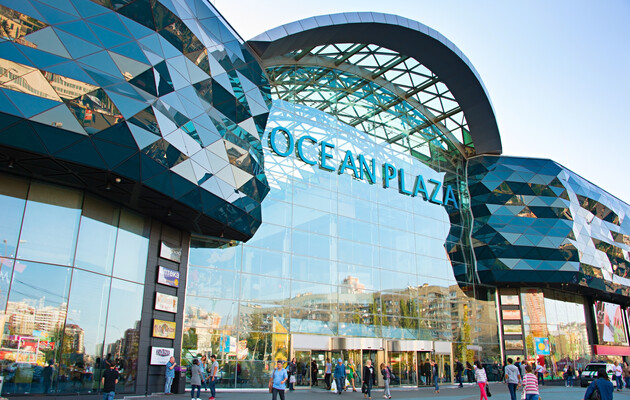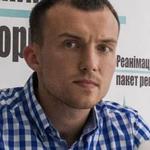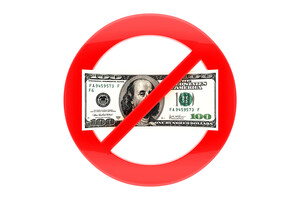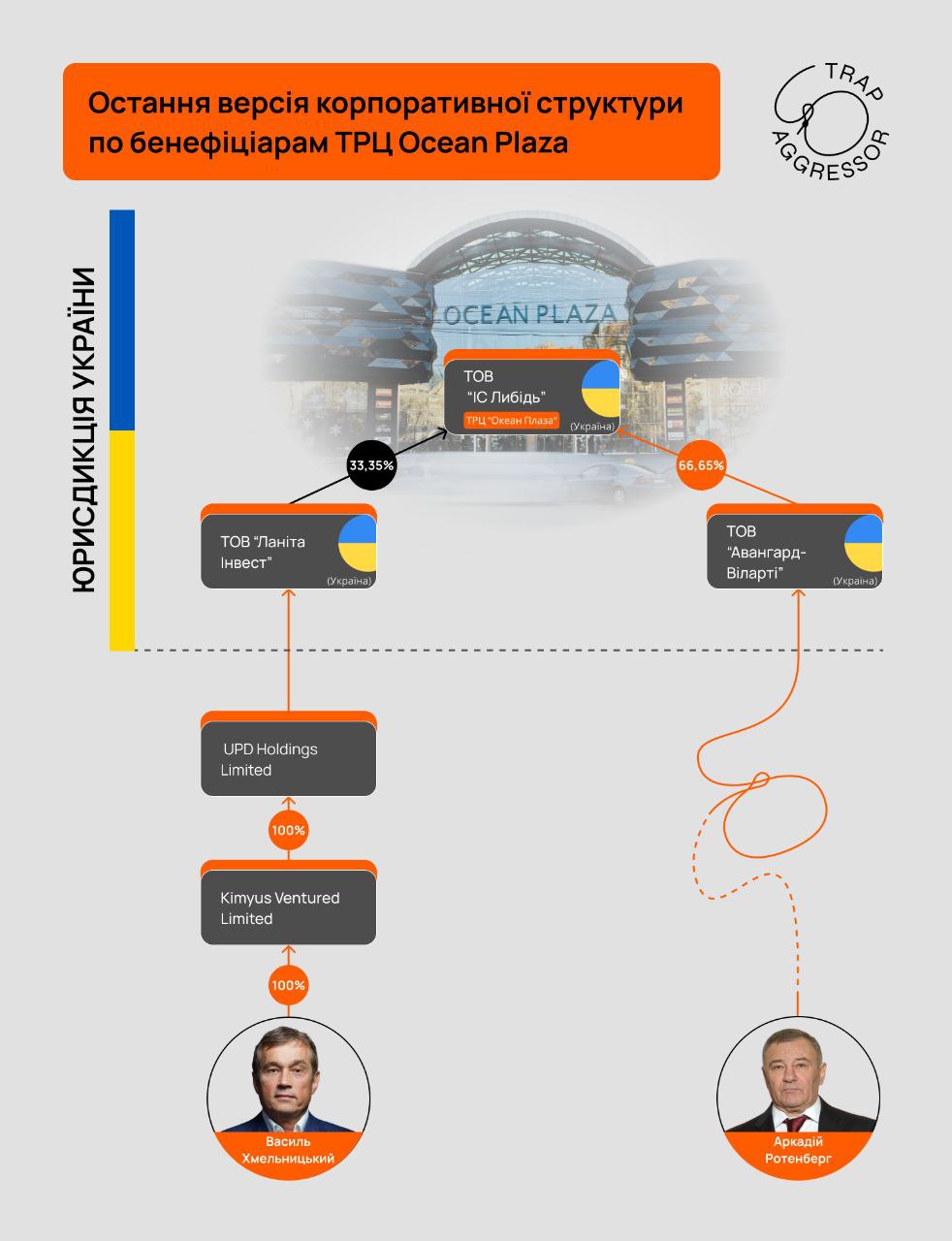Rotenberg’s Ocean Plaza. How the asset was confiscated and why it is important
The case to be discussed is important because it proves that the formal change of owners did not become an obstacle for the court to establish the beneficiaries of the company. The judicial review of the lawsuit of the Ministry of Justice became an example of how, in fact, the situation should be analyzed not according to formal signs but clearly on the merits of the case.
A month ago, we published an article on how one of the key Russian oligarchs, Oleg Deripaska, had his assets confiscated in Ukraine. This time, the StateWatch team, as part of the Trap Aggressor project...tells us about another “big fish” caught by the Ukrainian authorities, namely Arkady Rotenberg. For deep background, Rotenberg is one of Putin’s two closest friends. In Ukraine, he owns only one, but extremely significant asset. This is the shopping and entertainment complex Ocean Plaza, which was built in Kyiv a decade and a half ago. Then the Ukrainian businessman Vasyl Khmelnytskyi acted as a partner in this business.
Rotenberg has been friends with Putin since childhood, as they went to the same sports section in Leningrad at that time. And for several dozen years in a row, they have been supporting each other, gaining power and tens of billions of dollars through corruption schemes in Russia. This is indeed a person who can rightly be called not a big businessman, but rather an oligarch, a person who influences the policy of the aggressor country.
Now let’s get to the heart of the matter — the confiscation of one of the most expensive shopping malls in Ukraine. The project of the center was carried out jointly by the Rotenbergs and Khmelnytskyi, and the concept itself was “bought” by the Russian oligarch during the presentation, long before its implementation in the Holosiivskyi district of the capital.
On March 3, the Ministry of Justice filed a lawsuit with the High Anti-Corruption Court with a demand to take away 2/3 of the corporate rights in Ocean Plaza due to the application to the Russians of the penalties provided for in the 2022 amendments to the Law On Sanctions. There were four defendants: Arkady Rotenberg, Igor Rotenberg (son of Arkady), and their “frontiers” – businessmen Oleksandr Ponomarenko and Oleksandr Skorobagatko. Charges were to be imposed on 100% of Avangard-Vilarti LLC and 66.65% of Lybid Investment Union LLC (hereinafter – IS Lybid). The representative of third parties, who did not make independent claims, did not object to the satisfaction of the claims. Meanwhile, we would like to remind you that on May 10, 2022, 100% of the corporate rights of Avangard-Vilarti and funds in the bank account were seized with a ban on any spending operations, except for the payment of taxes and salary payments. Already on September 10 of the same year, the court canceled the seizure of 33.35% of the corporate rights of the specified company, leaving 66.65% under seizure. By analogy, it happened with IS Lybid LLC.
During the trial, it became known that the founders of Lybid were residents of Ukraine — Avangard-Vilarti LLC (66.65%) and Lanita Invest LLC (35.35%). In turn, the founders of Avangard were Cypriot Ocean Plaza Project (99.99%) and Ethoder Investments Limited (00.01%). Meanwhile, as one of the participants of the hearing stated, the circumstances of acquiring ownership of corporate rights and the specifics of their ownership are unknown to them. Looking ahead, we would like to mark the work done by the Ministry of Justice with the participation of other participants in the procedure for the confiscation of Russian assets of Putin’s closest friend. Once upon a time, as if in a past life, I worked as a corporate lawyer, so I responsibly declare that this is the best judicial text in the field of corporate law that I have come across in my entire life.
The judges made their decision on the basis of proper evidence of the Rotenbergs’ connection with the asset, no matter how the latter wanted to hide their “traces” behind a whole series of corporate “ping-pong,” transferring the rights among the jurisdictions of Ukraine, the Russian Federation, the Republic of Cyprus, the island of Jersey, etc. Certain phrases of the servants of Themis deserve special attention, in particular the following: “The sanction in the form of confiscation of assets to the state’s income is not punitive in nature, but political and economic because it was introduced only as a result of an armed attack by the Russian Federation, in view of the direct threat to the existence of statehood (legal capacity) of Ukraine and applies exclusively to those persons whose expression of will can affect and/or affects the adoption of a political decision regarding the cessation of armed aggression.” In addition, the series of transfers of corporate rights should be considered the first steps to bypass international and Ukrainian sanctions, carried out with the aim of preserving the defendants’ property rights to assets in Ukraine by artificially creating additional burdens of such rights with the participation of a group of companies controlled by them.
If you visually depict one of the previous corporate connections of the mentioned persons, it looked like this (see Fig. 1).
In other words, the direct connection between Rotenberg and Ponomarenko with Skorobagatko was proven in court. As it became known from the hearing, these are business partners. And the last two often assist a key Putin friend.
In particular, structural connectivity can be seen in the configuration shown in Fig. 2.
In addition, we should also note that Vasyl Khmelnytskyi’s structure was separated from IS Lybid LLC through simple steps and established through United Partners Development. Let us explain this: in the corporate structure of the company that owns the Ocean Plaza shopping center, they simply allocated 1/3 of the rights to the Ukrainian businessman so that he would not accidentally be affected by sanctions. The corporate scheme looked as shown in Fig. 3.
Also, the names of foreigners appeared in the legal process, in particular, Swiss citizens Suzanna and Andrea Rishaal Vallabh. But in fact, these are professional “attorneys” acting in the interest of the Rotenbergs. As a result, it is easy to conclude that it is not the Swiss but rather the Rotenbergs who are the beneficiaries of certain offshore companies that ultimately owned the rights to the capital shopping center.
I was also pleased by the mention that Rotenberg Sr. controlled the Russian company Stroygazmontazh, which not only depended on contracts with Gazprom but also built the so-called Crimean Bridge. And Rotenberg Jr. appeared as the owner of cartridge factories in the Russian Federation. The consistency and cynicism of the mentioned persons indicated only one thing: they fully and for a long time supported the preparations for aggression against Ukraine, and also erected engineering structures to connect the territory of sovereign Ukraine (AR Crimea) with the territory of Russia. As noted in court, Ukrainian and international sanctions were gradually imposed on the relevant persons even before the full-scale invasion. That said, all these measures of an economic nature against the Rotenbergs did not lead to a change in the behavior of the defendants, who continued to support the armed aggression that began way back in 2014.
Interestingly, paragraph 89 of the court decision of the High Anti-Corruption Court of Ukraine regarding the Rotenbergs indicates that any activation of the change of the owners of corporate rights was exclusively connected with the introduction of new international and/or Ukrainian sanctions, which gives the opportunity for the servants of Themis to “crystallize the purpose of such painstaking ‘work’ many people involved.” Of course, this goal became obvious to the panel of judges — "avoiding the negative consequences of the sanctions applied to the defendants and saving their assets."
Summarizing the decision of the Supreme Administrative Court, the panel of judges made a fundamental conclusion: the actual beneficiaries of 66.65% of the authorized capital of IS Lybid LLC and 100% of Avangard-Vilarti LLC were and remain Arkady Rotenberg, his son Ihor Rotenberg, and their accomplices Ponomarenko and Skorobagatko. And the very change in the formal composition of participants (shareholders) at all levels of the corporate structure of the companies connected with them with the involvement of persons under their control was a forced, purely formal step. As the court pointed out, these steps were obvious, albeit very veiled, ways to evade the negative consequences of sanctions and keep their assets in Ukraine.
We can congratulate the Ukrainian state on another success in confiscating the assets of Putin's entourage for armed aggression against our country. Now we should clearly expect an appeal. But for some reason it seems that it is doomed to failure.
Finally, this case against Rotenberg demonstrates that even after transferring his assets in Ukraine to the “Cypriot cat,” no Russian oligarch will be able to protect his property from confiscation in the interests of our state. Where there’s a will, there’s a way.
Read this article in russian and Ukrainian.
Please select it with the mouse and press Ctrl+Enter or Submit a bug



















 Login with Google
Login with Google